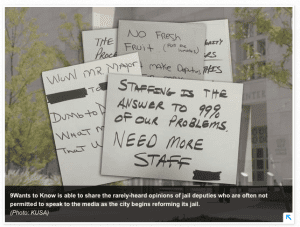The Denver jail and its suggestion box program made the local news, thanks to a Freedom of Information Act request:
“9 quotes from Denver Jail suggestion box”
What do we see in the one image from the video, at left? The common lament of “MORE STAFF.”
This is a common lament across industries, including in healthcare. Just give us more people, more money, and more space and everything will be solved. This often isn't true. Sometimes, it is. But, it's interesting that people often leap to “more, more, more” before thinking about other solutions.
That said, if a jail is seriously understaffed, leaders (and the public) should take action. I've been involved in some Lean healthcare projects where we actually selectively added some people in a process. We weren't “throwing people at the problem” and adding people was done after a careful analysis of workloads and customer demand. Sometimes, adding people is the right thing to do.
See the TV news video below for more of the story:
I'm all for getting employee ideas… but the outdated suggestion box model doesn't work (and “Kaizen” is the better, more effective alternative).
One problem is anonymous employee ideas. In certain circumstances, employees need to be anonymous (if they're being a whistle blower). Otherwise, anonymity interferes with improvement. Leaders and colleagues can't follow up with the person who had an idea. It's hard to collaborate with anonymity. That said, leaders have to create an environment where there's no fear of speaking up or making suggestions with your name associated with it. The need for anonymous suggestions, to me, suggests a real culture problem. The TV anchor describes “a troubled agency.”
One person wrote an eight-page letter. Another sign of problems that aren't being talked about or addressed.
The writer pointed out:

It's to improve, when trust and respect are absent. A suggestion box won't work in that environment, nor will Kaizen.
You need to take care of the staff so they can take care of the public (and the same is true in hospitals):

Staff complained about shifts being reduced from 12 hours down to 10. But, as in nursing, longer 12-hours shifts lead to errors due to fatigue.
A recent study done by the University of Maryland concludes that the odds of making patient errors increases three-fold when nurses work 12-hour vs. 8.5-hour shifts.
Jail staff point out the same might be true about supervisors, who are still on 12-hour shifts. Changing employee shifts without changing supervisor shifts… that's a recipe for people being upset.
We can't completely diagnosis this from the outside… but it's hard to see how somebody thought a suggestion box would do more than air dirty laundry to the public who oversees the jail.
Have any of you worked to address underlying trust and respect issues before launching a suggestion box or, better yet, a Kaizen program?
Please scroll down (or click) to post a comment. Connect with me on LinkedIn.
Let’s work together to build a culture of continuous improvement and psychological safety. If you're a leader looking to create lasting change—not just projects—I help organizations:
- Engage people at all levels in sustainable improvement
- Shift from fear of mistakes to learning from them
- Apply Lean thinking in practical, people-centered ways
Interested in coaching or a keynote talk? Let’s start a conversation.










![When Was the Last Time a Leader Around You Admitted They Were Wrong? [Poll]](https://www.leanblog.org/wp-content/uploads/2025/07/Lean-Blog-Post-Cover-Image-2025-07-01T212509.843-100x75.jpg)